Barton Malow Bundle
Who Really Steers Barton Malow Company?
The ownership structure of a company is a crucial determinant of its strategic direction and long-term success. Unraveling the ownership of a major player like Barton Malow Company, a leading construction services firm, offers critical insights into its operational accountability and market influence. This exploration will dissect the core question of "Who owns Barton Malow," providing a comprehensive view of its evolution.
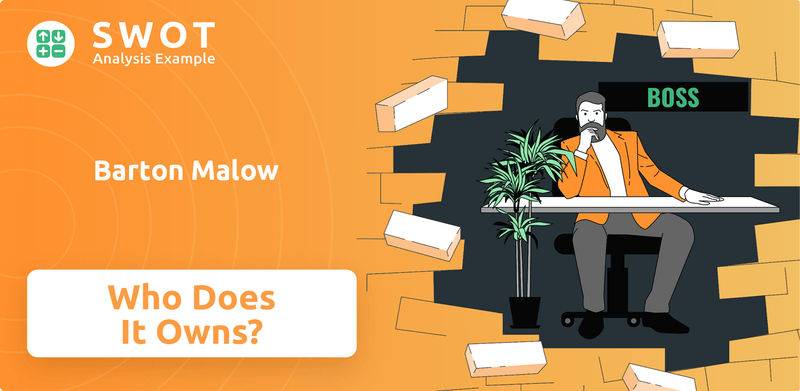
Founded in 1924, Barton Malow Company has a rich history marked by significant shifts in its ownership. From its inception as C.O. Barton Company to its current status, understanding the evolution of Barton Malow SWOT Analysis provides a deeper understanding of its resilience and strategic adaptability. Uncover the influence of key figures, including the Maibach family, and the transition to its current employee-owned model, to get the full picture of this major construction company. This deep dive into Barton Malow ownership will also reveal the company's mission to transform the construction industry.
Who Founded Barton Malow?
The story of Barton Malow Company began on August 4, 1924, in Detroit, Michigan, with Carl Oscar Barton at the helm. Initially, the company was known as the C.O. Barton Company. This marked the start of what would become a significant player in the construction industry.
Carl Barton, an engineering graduate from the University of Michigan, established the company. He held the majority of the initial shares, setting the stage for the company's early ownership structure. This structure would evolve significantly over the years, reflecting changes in leadership and financial needs.
The early ownership of Barton Malow Company was primarily held by Carl Barton, his sister Margaret Rose Barton, and auditor Kins Collins. The initial directors of the company were also these three individuals. This structure provided a foundation for the company's early operations and growth.
Carl Oscar Barton initially owned almost all the shares.
Arnold Malow's investment was crucial for the company's survival.
The company was renamed to reflect the partnership between Barton and Malow.
Harold Butler and Ben Maibach, Jr. became part-owners.
Ben Maibach, Jr. became the majority owner after Butler retired.
Carl Barton sold his shares and stepped down as president.
In 1927, Arnold Malow joined the firm, infusing it with critical capital. He invested $25,000, which was borrowed from his brother-in-law, George Fink. This investment was a turning point for the company. By 1932, the company was renamed Barton Malow Co. Further changes occurred in 1949 when Harold Butler and Ben Maibach, Jr. became part-owners. In 1953, Carl Barton sold his shares back to the firm for $500,000, and Arnold Malow took over as president. By 1960, Ben Maibach, Jr. became the majority owner, marking a significant shift in Barton Malow ownership. To understand how the company has grown, you can read about the Growth Strategy of Barton Malow.
Understanding the ownership structure of Barton Malow Company provides insights into its history and evolution.
- 1924: Carl Barton establishes the C.O. Barton Company.
- 1927: Arnold Malow invests in the firm.
- 1932: The company is renamed Barton Malow Co.
- 1949: Harold Butler and Ben Maibach, Jr. become part-owners.
- 1953: Carl Barton sells his shares and steps down as president.
- 1960: Ben Maibach, Jr. becomes the majority owner.
Barton Malow SWOT Analysis
- Complete SWOT Breakdown
- Fully Customizable
- Editable in Excel & Word
- Professional Formatting
- Investor-Ready Format
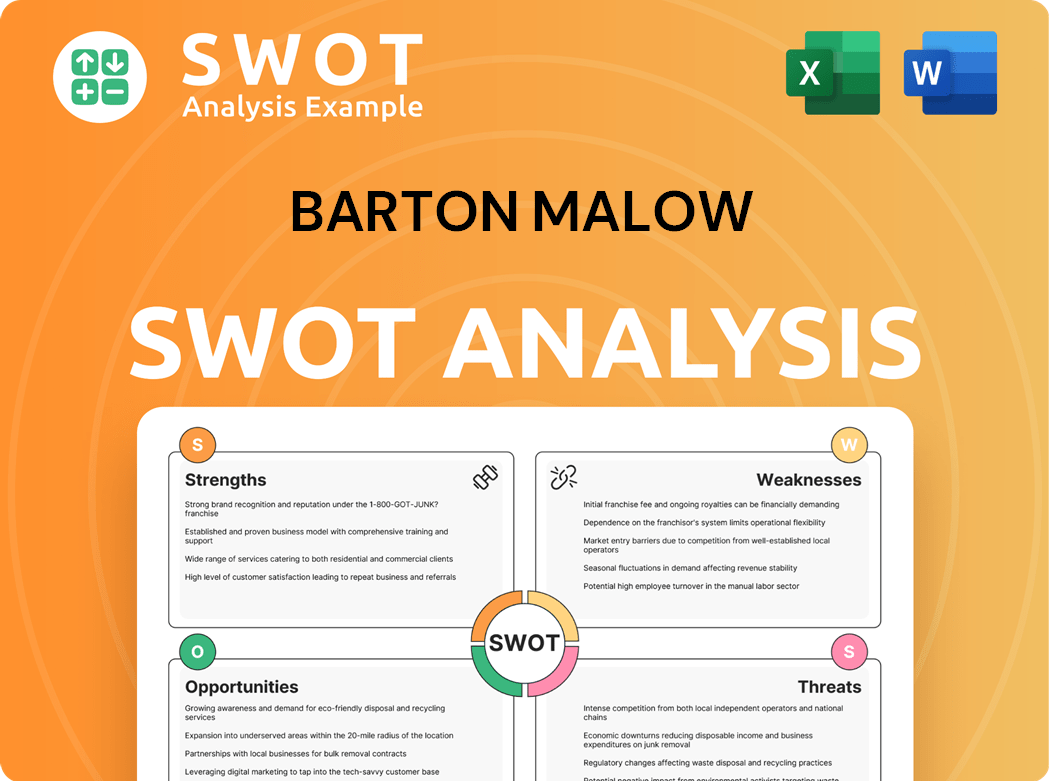
How Has Barton Malow’s Ownership Changed Over Time?
The ownership of the Barton Malow Company has seen significant changes since its inception. Initially guided by its founders, the company evolved under the leadership of Ben Maibach, Jr., who became the majority owner in 1960. The Maibach family's influence continued to grow, with Ben Maibach III taking over the presidency in 1981, while his father remained as board chairman. The family secured majority control in 1961, shaping the company's trajectory.
Today, Barton Malow operates as a 100% employee-owned entity, highlighting its commitment to its workforce. This employee ownership model is a core aspect of the company's status as a privately held corporation. Although employee-owned, the Maibach family still holds significant shares. Ryan Maibach, the current President and CEO, and Doug Maibach, Vice Chairman and Executive Vice President, are among the family members with the largest ownership stakes, as of 2011. Ben Maibach III and his sister, Sheryl Maibach, also maintain ownership, albeit to a lesser extent.
| Year | Event | Impact on Ownership |
|---|---|---|
| 1960 | Ben Maibach, Jr. becomes majority owner | Marks a shift towards family leadership |
| 1961 | Maibach family acquires majority control | Solidifies family influence in the company |
| 1981 | Ben Maibach III becomes President | Continues family leadership succession |
| Ongoing | Transition to 100% Employee Ownership | Transforms the company's structure, fostering shared responsibility |
This transition to employee ownership, while preserving the family legacy, has likely influenced the company's strategy and governance, cultivating a culture of shared responsibility and a long-term perspective among its workforce of approximately 3,500 employees. The company's revenue reached $6.5 billion in 2024, demonstrating its continued growth and market position as one of the top contractors in North America. For more insights into the competitive landscape, consider exploring the Competitors Landscape of Barton Malow.
Barton Malow's ownership has transformed from founder-led to employee-owned, with the Maibach family playing a crucial role.
- The company is now 100% employee-owned, fostering a culture of shared responsibility.
- Ryan Maibach currently leads as President and CEO.
- The company's revenue reached $6.5 billion in 2024, showcasing its strong market position.
- Barton Malow remains a prominent construction company.
Barton Malow PESTLE Analysis
- Covers All 6 PESTLE Categories
- No Research Needed – Save Hours of Work
- Built by Experts, Trusted by Consultants
- Instant Download, Ready to Use
- 100% Editable, Fully Customizable
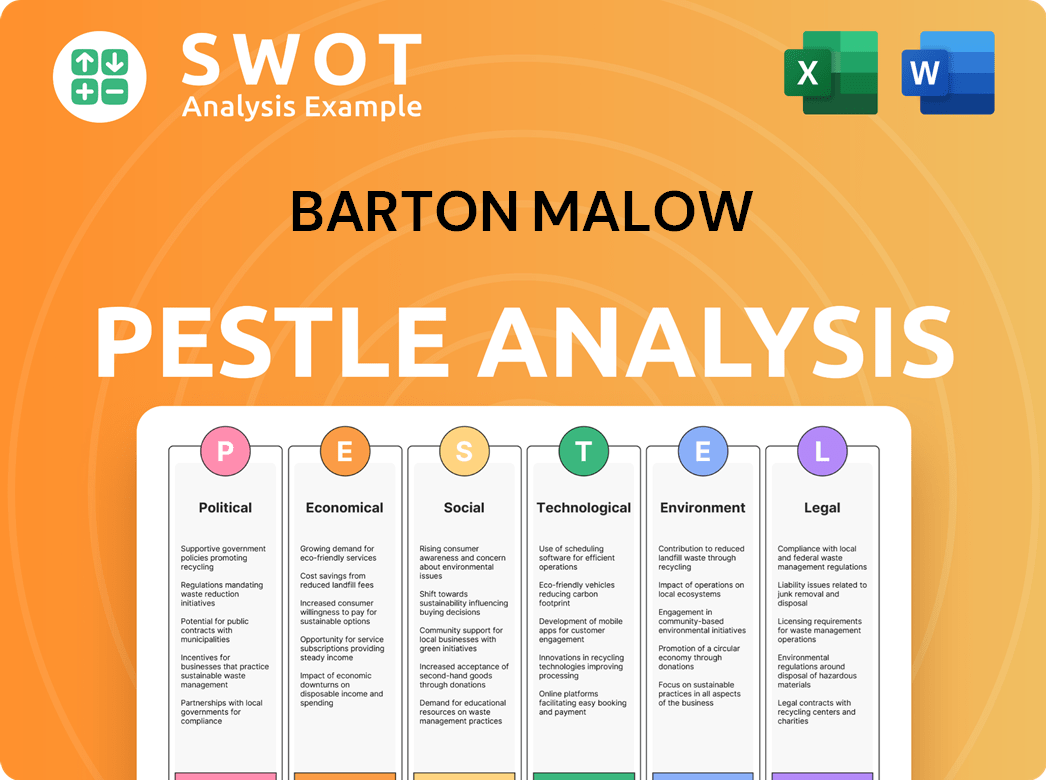
Who Sits on Barton Malow’s Board?
As a privately held, employee-owned entity, the specific composition and voting power of the board of directors of the Barton Malow Company are not publicly disclosed. However, the leadership structure provides insights into key decision-makers. Ryan Maibach currently serves as the President and CEO.
Other key executives include Chuck Binkowski as COO, Brandon Booth as Chief Legal Officer, Cesar Diaz as Senior Vice President of Data Analytics, Jonathon Feldotte as Vice President of Preconstruction + Planning, Dana Galvin Lancour as Vice President of Branding + Communications, David Gregor as Vice President of Building Trades, Sean Hollister as Senior Vice President, North Central, Todd Ketola as Senior Vice President, Southeast, Luke Knochel as Senior Director of Project Controls, Matt Lentini as Senior Vice President of Energy + Industrial, Nerissa Morris as Chief People + Culture and External Relations Officer, Neal Morton as Senior Vice President of Risk Management, Lindsey Rem as Senior Vice President of Business Transformation, Gabe Rodriguez-Garriga as Vice President of Strategy + Environmental Analysis, Nicole Sakhleh as Vice President of Legal, Jennifer Sulak Brown as Senior Vice President of Talent + Organizational Development, and Brandon Yezbick as Chief Financial Officer. This team reflects the company's operational and strategic leadership.
| Position | Name | Title |
|---|---|---|
| President & CEO | Ryan Maibach | President and CEO |
| COO | Chuck Binkowski | COO |
| CFO | Brandon Yezbick | Chief Financial Officer |
Historically, the Maibach family has held a significant role in the company's leadership. Ben Maibach III previously served as chairman and CEO before Ryan Maibach took over as president in 2011. The board also includes non-employee members, like Sandra Pierce, and others with external expertise. Jeffrey L. Baxa, a Senior Vice President, was elected Chairman of the Associated General Contractors of Michigan's board in 2024, indicating leadership presence in industry associations. The structure suggests a blend of internal and external leadership aimed at strategic guidance. The company's employee count is not publicly available, but the company's employee ownership structure is a key aspect of its identity.
The Barton Malow Company is 100% employee-owned, with Ryan Maibach as President and CEO. The leadership team includes key executives in various operational areas. This structure reflects a unique ownership model within the construction industry.
- Employee-owned company
- Ryan Maibach is the current CEO
- Multi-generational leadership
- Board includes internal and external members
Barton Malow Business Model Canvas
- Complete 9-Block Business Model Canvas
- Effortlessly Communicate Your Business Strategy
- Investor-Ready BMC Format
- 100% Editable and Customizable
- Clear and Structured Layout
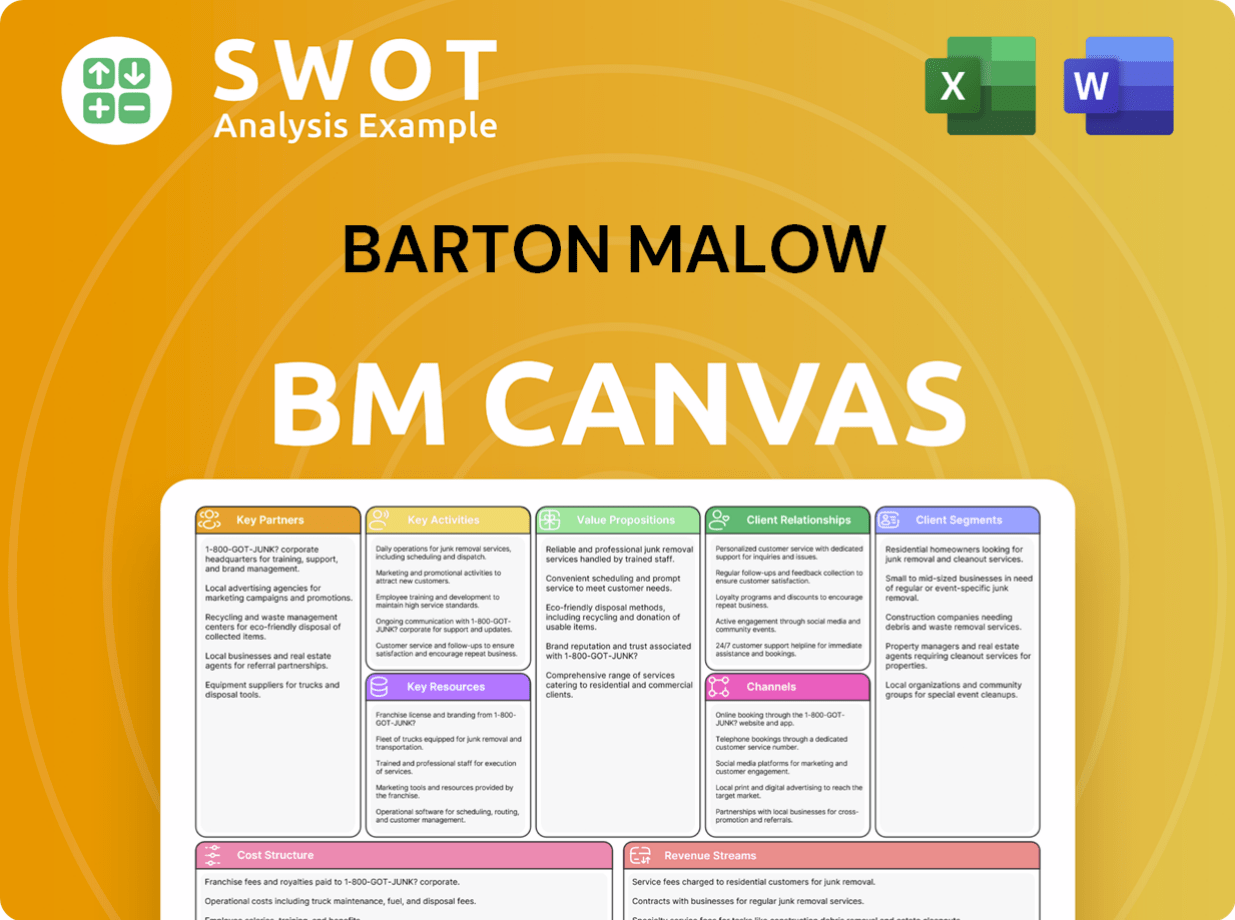
What Recent Changes Have Shaped Barton Malow’s Ownership Landscape?
Over the past few years, the Barton Malow Company has solidified its position as a leading construction firm, primarily because of its unique 100% employee-owned structure. This ownership model has remained a core aspect of its identity, contributing to its sustained growth and operational stability. The company celebrated its 100th anniversary on August 4, 2024, marking a century of operations and its evolution into a multi-billion-dollar construction enterprise.
Financially, Barton Malow reported a revenue of $6.5 billion in 2024, a significant increase from $4.8 billion in 2023. The company's consistent growth is also reflected in its rankings. It was ranked No. 19 on Engineering News-Record's 2024 'Top 400' Contractors list, with $6.4 billion in domestic revenue and $130 million in international revenue. This financial performance highlights the company's robust market presence and successful project execution capabilities. For more insights, check out the Marketing Strategy of Barton Malow.
| Metric | 2023 | 2024 |
|---|---|---|
| Revenue | $4.8 billion | $6.5 billion |
| ENR Ranking | N/A | No. 19 |
| Domestic Revenue | N/A | $6.4 billion |
| International Revenue | N/A | $130 million |
Recent strategic moves by Barton Malow include significant project wins and a continued focus on innovation. In March 2025, a joint venture between Barton Malow and AECOM Hunt was selected for a $400 million renovation project at Camping World Stadium in Orlando, Florida, with completion set for the next two years. The company also continues its work on major projects like the Ultium Cells lithium-ion battery cell manufacturing facility in northeast Ohio, which is scheduled to begin production in Q4 2024 and employ over 1,700 people by the end of 2025. Leadership continues to evolve with internal promotions, such as Alan Blanchette to Vice President of Project Delivery and Kevin Zeleji to Vice President of Field Services in January 2025.
Barton Malow is 100% employee-owned, a structure that fosters a strong sense of commitment and shared success among its employees. This ownership model is a key factor in the company's culture and long-term stability.
The company reported a revenue of $6.5 billion in 2024, up from $4.8 billion in 2023, reflecting significant growth. This growth is supported by strategic project acquisitions and efficient operations.
Major projects include the Camping World Stadium renovation and the Ultium Cells manufacturing facility. These projects demonstrate the company's ability to handle large-scale, complex construction endeavors.
Barton Malow was recognized by Newsweek as one of the 'Most Trustworthy Companies' in America for the second consecutive year. Leadership advancements, like Alan Blanchette and Kevin Zeleji, highlight ongoing growth.
Barton Malow Porter's Five Forces Analysis
- Covers All 5 Competitive Forces in Detail
- Structured for Consultants, Students, and Founders
- 100% Editable in Microsoft Word & Excel
- Instant Digital Download – Use Immediately
- Compatible with Mac & PC – Fully Unlocked
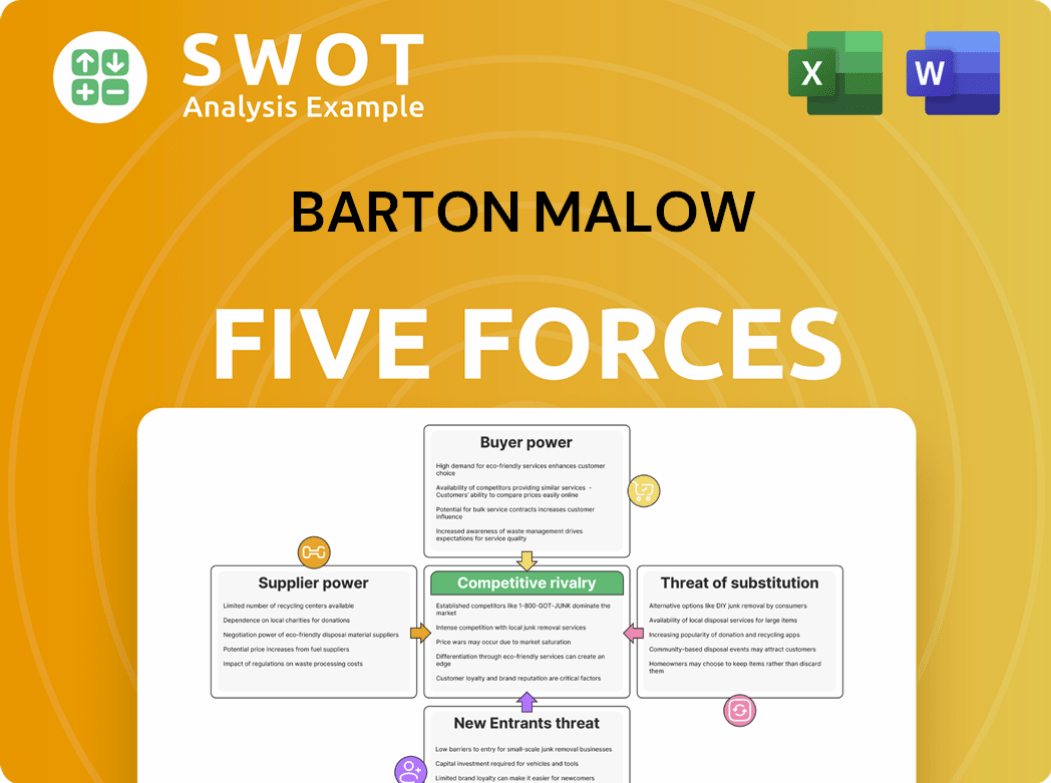
Related Blogs
- What are Mission Vision & Core Values of Barton Malow Company?
- What is Competitive Landscape of Barton Malow Company?
- What is Growth Strategy and Future Prospects of Barton Malow Company?
- How Does Barton Malow Company Work?
- What is Sales and Marketing Strategy of Barton Malow Company?
- What is Brief History of Barton Malow Company?
- What is Customer Demographics and Target Market of Barton Malow Company?
Disclaimer
All information, articles, and product details provided on this website are for general informational and educational purposes only. We do not claim any ownership over, nor do we intend to infringe upon, any trademarks, copyrights, logos, brand names, or other intellectual property mentioned or depicted on this site. Such intellectual property remains the property of its respective owners, and any references here are made solely for identification or informational purposes, without implying any affiliation, endorsement, or partnership.
We make no representations or warranties, express or implied, regarding the accuracy, completeness, or suitability of any content or products presented. Nothing on this website should be construed as legal, tax, investment, financial, medical, or other professional advice. In addition, no part of this site—including articles or product references—constitutes a solicitation, recommendation, endorsement, advertisement, or offer to buy or sell any securities, franchises, or other financial instruments, particularly in jurisdictions where such activity would be unlawful.
All content is of a general nature and may not address the specific circumstances of any individual or entity. It is not a substitute for professional advice or services. Any actions you take based on the information provided here are strictly at your own risk. You accept full responsibility for any decisions or outcomes arising from your use of this website and agree to release us from any liability in connection with your use of, or reliance upon, the content or products found herein.